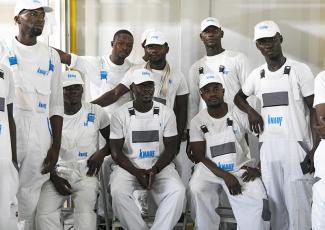KfW
A pioneer in challenging markets

The courses last between one day and two weeks and there are about 800 spots per year. “The construction sector in Ghana is booming, yet there is a huge shortage of skilled wor-kers,” explains Daniel Thomann, specialist coordinator for the develoPPP.de programme at DEG – Deutsche Investitions- und Entwicklungsgesellschaft. “This is very much in line with the project.”
The centre, which opened in February, is part of a large-scale training campaign by Knauf, an internationally operating building materials manufacturer based in Germany, DEG and the Federal Ministry for Economic Cooperation and Development (BMZ). A total of nine drywall construction training centres in six African countries and Iraq are planned in the current project phase. The centre in Tanzania opened in June 2018, Ghana is the second and a centre in Erbil will follow in October. Knauf is providing EUR 2.8 million for the project and DEG a further EUR 2.3 million from the BMZ’s develoPPP programme. In subsequent project phases, drywall construction training centres will be built in other African countries as well as in the Middle East and Asia.
“Knauf already has many years of experience with training centres of this kind, for example in Tunisia and Algeria,” says Thomann. “They are doing very well – the company has professionalised the training process.” Graduates have a good chance of finding a job or, if they had previously worked in the construction sector, more opportunities than before. Many also go freelance. This was shown by evaluations in Tunisia. “We want to systematically collect data about what happens to the people in the new centres,” says Thomann.
The overall goal of the project is to create at least 2,000 jobs. According to Thomann, this is a conservative estimate considering that 12,000 people are to be qualified within three years. Drywall construction is still unusual in Africa – brick construction is the prevailing method – but it has advantages that are becoming increasingly important there: drywall construction requires less energy and water and houses can be completed more quickly and designed more individually.
For Knauf, the main advantage is to make its products better known and tap into new markets. DEG has already supported several of the company’s investments and sees it as a “pioneer in challenging markets”, as Thomann says. “Knauf is an early mover and has a pull effect for other German companies.” It is important to DEG to offer more than just financing: its support gives Knauf more confidence in Ghana and other countries and opens up new sales channels.
Link
KfW, 2019: Africa – continent of opportunity.
https://www.kfw-entwicklungsbank.de/PDF/Download-Center/PDF-Dokumente-Medienkooperation-mit-E-Z/2019_10_Afrika_E.pdf








